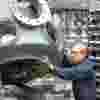Cost Effectiveness
Running a 250kW compressor for 8,000 hours per year will cost around £200,000, meaning reducing compressor power by one per cent will save £2,000. By moving to a double acting reciprocating piston design, the Belliss & Morcom range of oil free compressors achieves a step change of up to 10 per cent over typical industrial compressors, increasing your annual saving up to £20,000.
In addition, over 10 years the Belliss & Morcom reciprocating compressor can achieve a 33 per cent saving on TCO when compared to a typical industrial compressor.

